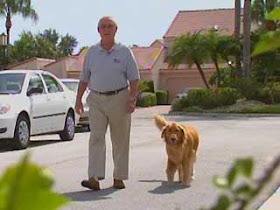WWII vet raises $2 million so injured soldiers can have service dogs

From
FOX News:
MIAMI — No one knows first hand the horrors of war more than World War II hero Irwin Stovroff (pictured).
That's why when Stovroff — who was held for one year in a Nazi POW camp before being freed by allied forces — learned that the U.S. government didn't supply service dogs for wounded soldiers returning from Iraq and Afghanistan, the 85 year old decorated hero from Boca Raton, Fla. made it his mission to overhaul the policy.
"It is a shame." Stovroff says about the lack of an official federal program that pairs up battle-injured veterans with guide and therapy animals that can greatly improve their rehabilitation. "I wanted to do something about it."
Stovroff has raised nearly $2 million dollars to help train and match up service canines with wounded combat vets. Stovroff is also pushing lawmakers for federal funding to finance the program that he says has received lots of bi-partisan praise.
Stovroff is not someone who shirks away from a tough mission.
Stovroff is not just a World War II vet, but a Distinguished Flying Cross recipient whose own personal tale reads like a Hollywood movie.
After Stovroff was shot down behind enemy German lines on his 35th bombing flight, he had to hide his Jewish faith from his captors to survive, even throwing away his dog tags before his plane crashed.
His latest mission is to bring awareness and support.
"The dog can become his eyes. He can become his legs. He can bring him anything he needs." Stovroff told Fox News with his golden retriever, Cash, lying by his side. "A dog is probably the best thing that can happen to these soldiers."
Stovroff says that the dogs help the injured soldiers, not just in a functional way, but therapeutically.
"They need a guide (but) they need the help and love of a dog as well," he says, petting Cash.
"Benjamin is awesome," says Navy veteran Joseph Worley about his golden retriever.
Worley who lost most of his left leg, and severely injured his right one in a 2004 roadside bomb in Fallujah, Iraq says that his service dog is much more than a pet, but a “vital” support system.
"He braces to help me stand up. He brings me my shoe when I put my prosthetic on. He stabilizes me when I walk," Worley says.
However, it can be expensive to train these canines. Costs to train a service dog can run between $30,000 to $50,000 per dog, Stovroff explains, the reason behind his lobbying Congress for extra help.
But his efforts are beginning to pay off. Earlier this month, Rep. Ron Klein (D-Fla.) introduced legislation to help train guide dogs and other service animals for wounded veterans.
According to a release by Klein’s office, The Wounded Warrior K-9 Corps Act would establish a grant program for organizations that provide wounded warriors and disabled veterans with service animals. On the Senate side, their newest member Sen. Al Franken (D-MN) has also put out a similar bill.
For wounded warriors this means not just a lifeline, but a friend.
“He is a completely trust-worthy companion that does not judge anything. He is willing to help you, and its entire life is based off making you happy,” says Worley.
 From FOX News:
From FOX News: